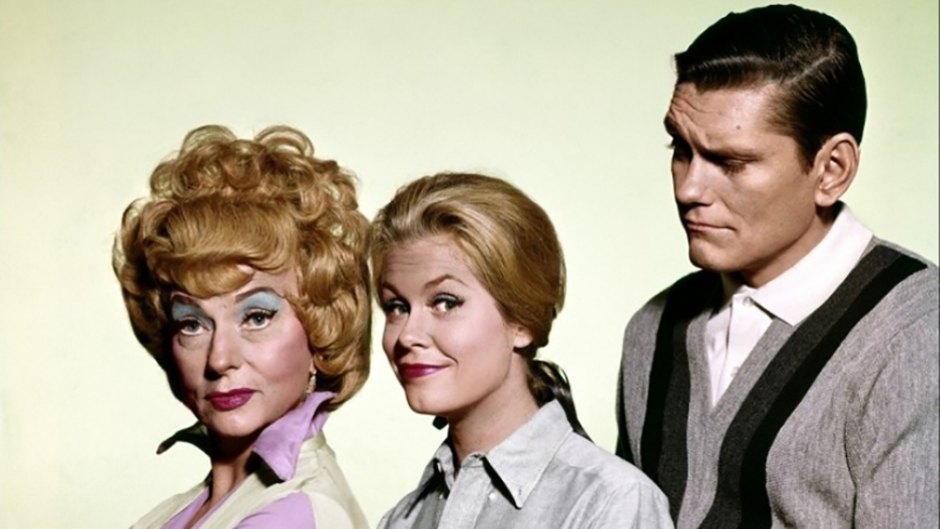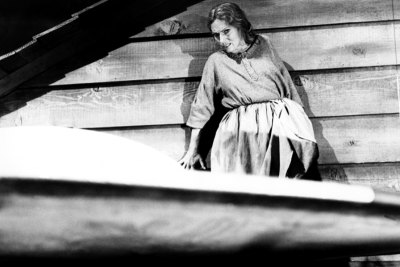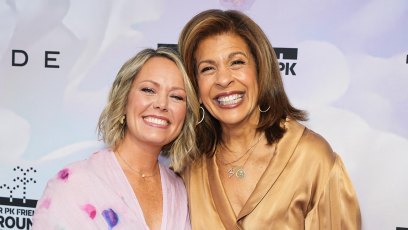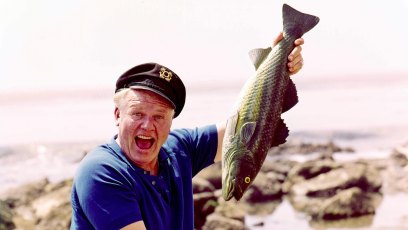
Screen Gems
Here’s What Happened to Agnes Moorehead Before, During and After Playing Endora on ‘Bewitched’
Having a successful Classic TV show is oftentimes a double-edged sword, on the one hand securing you a place in the hearts of generations of TV viewers while on the other somehow resulting in people not realizing the many other things a performer may have accomplished in his or her life. Examples include Vivian Vance from I Love Lucy, Maureen McCormick of The Brady Bunch and William Shatner of Star Trek. And then there’s Agnes Moorehead — Endora on Bewitched (currently airing on Antenna TV) — who had an extensive career in radio, movies, on stage and television long before she was cast as Elizabeth Montgomery’s mother on that series.
Charles Tranberg, author of the biography I Love the Illusion: The Life and Career of Agnes Moorehead, relates that while Agnes had been reluctant to sign on to Bewitched at first, she came to like playing Endora very much. “It enhanced her career,” he explains. “If she hadn’t done Bewitched, she would still have continued on as a respected character actress, but with a popular series like that one, she was able to achieve something she always wanted: genuine stardom and becoming a household name. It also provided her for eight years with a consistent and fairly lucrative income that she was able to supplement with other projects. She might have complained about the rigors of doing a series, but in the end she loved it and what it did for her career.”

Mark Dawidziak, author of, among other books, Everything I Need to Know I Learned in The Twilight Zone, notes, “As much fun as she was as Endora on Bewitched, her identification with that role has tended to obscure just how versatile she was as a performer. It’s a bit ironic, too, since her early movie roles, from the distant mother in Orson Welles’ Citizen Kane to the villain making trouble for Humphrey Bogart in Dark Passage, tended to type her as cold, forbidding women. Bewitched let her play that for laughs in a broad comic style. Between those extremes, however, was a deceptively versatile and durable talent. Her radio work alone speaks to that, from her work in Welles’ stock company for The Mercury Theatre on the Air to her landmark Suspense appearance in the original production of ‘Sorry, Wrong Number.’
“If you want to know how formidable a talent we’re talking about here,” he elaborates, “consider the 1950s tours she did of Shaw’s Don Juan in Hell, going toe-to-toe, so to speak, with Charles Laughton, Charles Boyer and Cedric Hardwicke. And it was pretty much just the four of them sitting on wooden stools holding audiences mesmerized. ‘More than Endora’ would be the theme for any discussion of Moorehead’s career, and her Twilight Zone appearance in ‘The Invaders’ is stirring proof of that. She never smiles. She never speaks a word. And look at the levels she brings to that performance. With her, we feel the sense of isolation, trepidation, puzzlement, fear, anger, resolution. And they knew Agnes Moorehead could pull that off; could bring all of that and more. One of those performers never destined to be in the top ranks of stardom of top billing, but one of those class that others recognized as an actor’s actor.”
For much more on Agnes Moorehead, please scroll down.
Be sure to check out and subscribe to our Classic TV & Film Podcast for interviews with your favorite stars!
1 of 25

Kobal/Shutterstock
Her Formative Years
She was born Agnes Robertson Moorehead on December 6, 1900 in Clinton, Massachusetts, daughter of former singer Mary McCauley and Presbyterian clergyman John Henderson Moorehead. “Agnes had a very happy childhood,” observes Charles Tranberg. “She never felt unloved and she adored her parents. Agnes would recall her father as ‘a great man with a magnificent voice and very handsome. He could quote great swatches from the Bible and Shakespeare. He was quite a showman.’ Agnes’ mother, Mollie, was louder, opinionated and had a flair for the dramatics. One friend of the family said that Mollie was a lady of ‘very strong opinions — and very outspoken.’ Her father’s ‘showmanship’ and her mothers ‘flair for the dramatic’ certainly rubbed off on Agnes. Agnes was also joined by a younger sister, Margaret.
2 of 25

Alex Kahle/Rko/Kobal/Shutterstock
Growing Up
“Growing up,” he continues, “Agnes and Margaret were teased because they were ‘PK’ (Preacher’s Kids). They spent a lot of time in church attending services and prayer meetings and generally helping their parents out. Agnes had an active imagination and she began to study the parishioners. At the dinner table Agnes would sometimes impersonate certain members of Pastor Moorehead’s congregation, such as the lady who led the choir or the young man who handed out hymn books, and her father would know what she was doing and ultimately he would tell her to stop, but always with a smile on his face.”
Noting Agnes’ well-known ability to quickly memorize dialogue, says Charles, “She always credited her father for this, because when she and her sister were naughty rather than punish them with a spanking he would assign them to learn a psalm or some bible passage and then they would have to recite it back to him.”
3 of 25

Anonymous/AP/Shutterstock
Taking After Mom
In terms of personality, he points out that many believed that Agnes was more like her mother than her father, because Mollie was “headstrong, lively and had a sharp wit, while her father, when not on the pulpit, could be more low-key and shy. As a youngster Agnes loved to read and enjoyed Mother Goose stories, but loved Grimm Fairy Tales. She would spend hours reading and then she would act out what she read. This became so common that Agnes’ mother would ask her, ‘Who are you today, Agnes?’”
The family moved to St. Louis when Agnes was 13, and the summer following their arrival she tried out for the St. Louis Municipal Ballet. Says Charles, “She was chosen to perform in the choir. But she knew she needed to get her father’s permission and many fundamentalist pastors would look down on the performing arts, but Pastor Moorehead actually encouraged Agnes and was pleased for her. She would spend the next four summers performing with the St. Louis Opera Company.”
4 of 25

Glasshouse Images/Shutterstock
Entering the Entertainment World
As to finding her way into the world of entertainment, he feels that her parents and their different personalities were an important factor in that decision: “Her father being a ‘showman’ on the pulpit who could spellbind audiences, and Mollie with her dramatic personality. Then there was Agnes’ own vivid imagination and how much she enjoyed reading and acting out what she read. Finally, she got a taste of performing living in St. Louis and being part of the ballet. She knew that she wanted to attend the American Academy of Dramatic Arts (AADA) in New York City. But she also knew that her father and mother wanted her to have an education, so she did attend Muskigum College in New Concord, Ohio majoring in biology, but also taking part in campus theatrical productions. When she graduated she went to teach for five years in Soldiers Grove, Wisconsin, where she directed school plays and also coached debate. Finally, in 1926 she saved enough money to go to New York and attend the AADA — and from there she never stopped. She would always be an actress and a teacher — teaching dramatics.”
5 of 25

Glasshouse Images/Shutterstock
Her ‘Tremendous’ Education
Performer, pop culture historian and author (The Lucy Book: Her Fifty Years in Television) Geoffrey Mark describes her approach to breaking into entertainment as being unusual. “Most people I’ve met in show business, including myself, just start very young,” he says. “You fight your way through to get somewhere. But Agnes had a tremendous education. She got her Bachelor’s Degree, she had a Master’s Degree and I think a doctorate in literature. She was open to doing all sorts of things in her life and didn’t rush into any of them. As far as I know, for all of her life Agnes was an enormously conservative human being. Deeply religious, deeply Republication, did not enjoy or put up with slang language or vulgar topics of discussion on a film set or even on the stage. She just felt that you’re coming there to have a magical — no pun intended — experience. Basically, everything she did, she prepared herself for. She also trained to be an actress alongside Rosalind Russell and others and just sort of felt her way into radio, where it turned out she could use that wonderful New England voice of hers that really sounded like nobody else’s. And she worked a great deal.”
6 of 25

CBS
A Star of Stage and Radio
Picking up the scenario, Charles details, “When she graduated from the AADA, she immediately began working. She kept busy as an understudy or bit player on stage and began doing roles on radio. Her first big break came on radio when she was cast in a mystery-suspense series called Mysteries in Paris over CBS. She was cast as a character named ‘Nana’ who was the ‘maid, chaperon, guardian and general factotum’ to the leading lady and helped her solve the mysteries. Agnes’ character became so popular that her role was expanded. This led to more radio work, including The March of Time, where actors impersonated newsworthy figures in presenting the news. Agnes specialized in impersonating Eleanor Roosevelt. Then she got the role of Margot Lane on The Shadow opposite a wunderkind named Orson Welles as Lamont Cranston. This began a friendship that lasted for the rest of Agnes’ life and Welles came to respect her more than any other actress. She became an integral part of Welles’ Mercury Theater of the Air on radio, where they presented classics such as Les Miserables, Dracula and Rebecca, where she played Mrs. Danvers. Her association with Welles led to her Hollywood career.
7 of 25

‘Citizen Kane’
“RKO invited Welles to make films for them and he brought along his ensemble cast from the Mercury to be his stock company,” he adds, “and, of course, Agnes’ first movie was also Welles’ first, and it’s one of the masterpieces of cinema, Citizen Kane, in which she plays Kane’s mother. For somebody who had never made a film before, she gives an assured performance. But it was in her second film, The Magnificent Ambersons, that she really shined. It is probably her greatest acting triumph as Aunt Fanny Minafer, a spinster who longs for love and never finds it. She is the glue that holds the film together and she received the New York Film Critics Award as Best Actress as well as an Academy Award nomination for Best Supporting Actress — the first of four she would receive.”
8 of 25

Warner Bros/Kobal/Shutterstock
A ‘Character Actress’
Speaking of Agnes’ association with Orson Welles, Geoffrey points to the fact that she was also a part of the historical War of the Worlds radio broadcast and, upon arriving in Hollywood was an immediate hit. “But she wasn’t a featured player,” he muses. “She was a character actress. She was talented enough to be the star, but so talented that she didn’t play star parts more often than not. There were no TV series with her in the lead, there were no Agnes Moorehead films. But when she was in a film, she stole it. Look at a film like Dark Passage in 1947. The main characters are played by Humphrey Bogart and Lauren Bacall, but you steal every scene from them? That says a lot. That means you’ve got an incredible amount of talent and that these two people allow you to do it means they have an incredible amount of respect for that talent.
9 of 25

Rko/Kobal/Shutterstock
Her ‘Tremendous’ Radio Career
“If you look at just her first three films — Citizen Kane, The Magnificent Ambersons and The Big Street — and people she’s working with like Orson Welles, Joseph Cotton, Lucille Ball, Henry Fonda … She is just hitting homeruns right off the bat while she has this incredible career in radio,” continues Geoffrey. “Her version of the radio play Sorry, Wrong Number was so successful that it was actually more famous than the film it was eventually made into, because it was the right length for the radio than for film, where the story had to be padded out too much.”
10 of 25

Universal/Kobal/Shutterstock
‘First Lady of Suspense’
For the rest of the 1940s, Agnes alternated between significant roles on radio and in the movies, becoming known as the “First Lady of Suspense” in films during that decade. Says Charles, “In the ‘40s she would receive two more Oscar nominations for Best Supporting Actress in Mrs. Parkington [1944] playing a glamorous courtesan, which was one of her favorite roles, because it allowed her to play against her usual type which in many instances were drab, neurotic women and spinsters. Her other Oscar nomination came in Johnny Belinda [1948] in which she did play a gruff, austere, yet loving aunt of Jane Wyman’s deaf mute character.” He also points to Dark Passage, “where she plays a total bitch — glamorous, yes, but also a murderess who allows Humphrey Bogart to go to prison for a murder she committed.”
11 of 25

Rko/Kobal/Shutterstock
Versatile
Enthuses Geoffrey, “She was so versatile; a natural talent who actually studied her craft. She was not someone found in a gas station or on a beach or in an elevator. She was somebody who had studied to do what she did. She didn’t have the vanity of gorgeous woman; she was willing to play anything that made sense to her and to look like whatever the part called for. That gives you tremendous versatility. She was always playing older women when she was a younger woman. She didn’t care. She cared if the part was good and that it suited her talents and that she could deliver what was necessary to be good. I’ve never seen Agnes Moorehead give a bad performance.”
12 of 25

Stf/AP/Shutterstock
‘Don Juan in Hell’
The next great opportunity for her came in 1951 when she hit the Broadway stage in the aforementioned production of Don Juan in Hell, with Charles Boyer in the title role, Charles Laughton as the devil and Cedric Hardwicke as the Commander. “As Donna Ana,” says Charles, “Agnes finds, to her chagrin, that she is in hell rather than heaven. It’s jolting, because she always believed she was a virtuous woman. Charles Laughton also directed and Agnes was chosen for the role in part because of her ability to change from an old wizened woman of 77 to a young lady of 27 — using only her voice to indicate this change. Her radio training certainly came in handy. This play was revolutionary in that it was done with no sets except for the actors sitting on stools before reading stands — turning the pages of the script —even though they had memorized the lines. Over the years Agnes would play this role many times in several different productions.
“In between she still did radio and movies, but it seems like her stage work became more important. In addition to Don Juan in Hell, she would begin appearing in a one-woman show where she did readings from the classics and also in plays such as The Rivalry, The Pink Jungle, Prescription Murder, Lord Pengo and High Spirits.”
13 of 25

20th Century Fox/Kobal/Shutterstock
Next Stop, Television
Continuing, Charles details, “Agnes made her television debut in 1953, but was so busy making movies, doing radio appearances and appearing on stage that she didn’t really get into television until the late 50’s when she began doing a lot of anthology shows like Playhouse 90, General Electric Theater and Ford Startime. In 1960 she played the witch Mombi on an episode of The Shirley Temple Show titled “The Land of Oz,” which would be directed by William Asher, who would later be her most frequent director as well as producer on Bewitched. I would contend that her most famous television appearance prior to Bewitched was on the Twilight Zone episode ‘The Invaders,’ which is considered a classic. The show is done totally without dialogue and it’s a tour-de-force by Moorehead. Prior to Bewitched she gave a superb performance in Hush … Hush Sweet Carlotte [1964], where she effectively chews the scenery to the delight of the audience as Bette Davis’s devoted maid who ends up being murdered by a not so sweet Olivia de Havilland. The part earned Agnes her fourth and final Oscar nomination as Best Supporting Actress.”
14 of 25

Screen Gems/Kobal/Shutterstock
Bewitching Audiences With ‘Bewitched’
Charles points out that Agnes had been interested in a TV series for a number of years before Bewitched came along. “She actually had auditioned to play the character of Hazel on the television show of the same name based on the cartoons by Ted Key,” he details. “Key told me that it came down to Agnes and Shirley Booth, but that while Agnes was fine she didn’t capture the essence of that character the way Booth did, so it went to Shirley Booth. Then, in 1963, Screen Gems approached [producer/director] Bill Asher and his wife Elizabeth Montgomery to do a series based on a script about a beautiful witch who falls in love with a mortal. Montgomery would play the witch.”
15 of 25

Columbia/Kobal/Shutterstock
Becoming Endora
A supernatural twist on the usual sitcom about a newly-married couple, the show cast Dick York as Darrin Stephens, married to Elizabeth’s Samantha, the two of them dealing with her interfering mother who did not approve of of her daughter marrying a mortal. As to how Agnes ended up being cast, in a previous look at the show Herbie J Pilato, host of the Amazon and Shout Factory streaming Classic TV talk show Then Again With Herbie J Pilato, and author of Twitch Upon a Star: The Bewitched Life and Career of Elizabeth Montgomery, explains, “They could not find their Endora, and Elizabeth and Bill were shopping in Bloomingdale’s in New York and he ran into her and asked her about doing the show. He ran over to Elizabeth and he says, ‘I found mother!’ And she thought he meant his mother or hers. So they asked Agnes Moorehead right on the spot if she would do the show and she replies, ‘Maybe, maybe not.’ She ended up doing it, but gave the sense that the pilot was beneath her. She said, ‘I’ll do the pilot, but it probably won’t sell.’ Then it sold and she still gave the impression that it was beneath her. But everybody — including her — knew she was having a great old time throwing herself over the mantle at the fireplace in those chiffon gowns. She just ate it up. She and Elizabeth had a very dear respect for each other. Agnes Moorehead respected her as an actress and also respected her because of her father [Robert Montgomery], who she knew.”
16 of 25

Columbia/Kobal/Shutterstock
The Irony
Opines Geoffrey Mark, “It’s ironic that people feel her career starts and stops with Bewitched, because it was a project for which she had little enthusiasm for and was amazed that it went past one season. She couldn’t see why an audience could cotton to something that’s so wild and, in her mind, so repetitive. And in a way, she’s right. If you sit down and binge watch Bewitched, every second or third episode Endora is turning Darrin into something. Well, there’s only so many times you can do that before you’re repeating yourself, but there was something so charming about the show.
17 of 25

Moviestore/Shutterstock
An Absolute Professional
“Another thing,” he adds, “is that it was so incredibly well cast. To take a woman like Miss Moorehead, who could do almost anything, and having her play a part she doesn’t particularly like, but, being the professional she is, throwing herself into it, not caring how she looks or how she comes across, but just playing the part, is brillliant. Endora should not be just unlikable in a funny sort of way, but unlikable in an unwatchable sort of way. That’s how the part is written. And yet Agnes is able to take what is basically a one note joke and give it dimension and flavor, because she’s so good at what she does.”
18 of 25

AP/Shutterstock
Winning an Emmy
Opines Charles, “In the end I think what led Agnes to say yes was it was a good deal: $5000 for the pilot, which would take maybe a week or so to shoot. I don’t believe she thought it would be picked up and she was a bit surprised when it was, but she’d signed a contract to do a series if one resulted. That said, she came to like the show very much and the income and fame it gave her. At the same time, she knew she didn’t want to appear each week, so she signed a contract which allowed her to only appear in about eight out of every thirteen episodes so she would have time to rest or work on other projects, such as her one-woman shows and guest appearances on other television shows or even an occasional movie. One of the shows she appeared on while on Bewitched was The Wild Wild West in an episode called ‘Night of the Vicious Valentine,’ where Agnes plays a marriage broker who arranges marriages between very rich, powerful men and younger women. Then the men are murdered and the women inherit their money and power so they would eventually be able to take over the government. It was a great episode and won Agnes an Emmy for her performance. In addition to that, Agnes was nominated six out of the eight years for an Emmy for playing Endora on Bewitched — but never won for that iconic role.”
19 of 25

AP/Shutterstock
Back to Broadway
That iconic role came to an end with the demise of the series in 1972, but Agnes didn’t shed much in the way of tears when it was time to move on, never realizing how little time she actually had left. After the show, she reprised her role from Don Juan in Hell for a Broadway run and then tour, supplied the voice of Mother Goose in the animated film Charlotte’s Web, and was back on Broadway in 1973 for an adaptation of the film Gigi. Unfortunately, she fell ill during that production and was replaced by Arlene Francis. “She was suffering from terminal cancer,” says Charles. “Her great friend, Debbie Reynolds, told me that Agnes told her that she would beat it and she put herself ‘in God’s hands.’ Finally she was admitted to the Mayo Clinic Hospital in Rochester, Minnesota in early April 1974. She declined rapidly in the next three weeks. Five days before she died, she spoke with Debbie Reynolds for the final time. She finally had given up and told Debbie, ‘It’s over. I’m dying. Please pray for me.’ She died on April 30, 1974 at age 73 in the arms of her mother, Mollie. By the way, her mother would live to be 106, dying in 1990 — outliving Agnes by 16 years.”
20 of 25

RKO Radio Pictures
Struggle With Cancer
The belief is that the cancer that killed Agnes Moorehead may have developed as a result of shooting John Wayne’s 1956 film The Conqueror in Utah, much of the crew likely being affected by radioactive fallout from atmospheric atomic bomb tests at the time. By 1980, 91 of the film’s 220-person crew had either been infected with or died from some form of cancer.
21 of 25

Kobal/Shutterstock
Personal Life
Agnes was married twice. First in 1930 to actor John Griffith Lee 1952. The couple served as foster parents of a boy named Sean, who she “kept,” though there may or may not have been an actual adoption. She married actor Robert Gist in 1954, but that relationship ended in divorce four years later. A real victim in all of this was Sean, who begged Agnes for attention, though she all but ignored him, the hired help more or less raising him. Providing a bit more detail, Geoffrey Mark explains, “Sean did not grow up to be a conservative Christian, and being a Christian was very important to Miss Moorehead. When he did not grow into the conservative, God-fearing model that she wanted him to be, she disowned him. You talk about Jesus, his love, and then because this man won’t behave the way you want him to, you just walk away from him? I’ve never heard anyone say that she was anything but a total professional on any set, but that situation with Sean shows a side of her that informs her spirituality and how tight her heart was on some things.”
22 of 25

Columbia/Kobal/Shutterstock
Final Thoughts
There is no small sense of irony in the fact that the role of Endora, which was likely the one Agnes Moorehead was the least passionate about over her long career, is the one by which she will be forever remembered. Says Geoffrey, “One of the reasons that Endora is so good, even though she thought it was a ridiculous part, is that she dove into it and, like with most good productions of any kind, the makeup and hair and costumers turned her into Endora almost before she opened her mouth. Her look made a statement. For her, it was a wonderful acting exercise being able to bring something new each time to something you don’t particularly care for. There are lots of actors who have to play parts or be in films or television or plays they have no particular love for, but it’s a paycheck. In her case, this was an annuity paycheck, because there were many seasons of the show and reruns, but she didn’t even live to enjoy the money generated in syndication. It’s also very rare, I think, for a woman to be 70 and still be working on a weekly television series. A series that made her an icon. We would not be talking about Agnes Moorehead, despite her huge body of work, if it were not for Bewitched.”
23 of 25

Screen Gems
Her Memory
Notes Charles, “The years since her death have been kind to Agnes. She is, through the wonder of televison, still recognizable when many character actors of her era are long forgotten. Bewitched is still shown and still popular today on retrospective channels and Agnes continues to find new fans due to Endora. Thanks to classic movie stations like TCM, many of Agnes’s films are still being watched and enjoyed as are many of her outstanding radio performances due to the growing interest by classic radio fans.”
24 of 25

Screen Gems
Who Was Agnes?
In reflecting on Agnes as a person, Charles opines, “I would say she had a contradictory nature. She was a deeply religious woman from the time of her upbringing and yet she loved to have fun and she smoked and did drink liquor, but not to excess — and above all she was in an industry that fundamentalists of that era looked down on and yet she embraced wholeheartedly and accepted all kinds of people no matter if they were straight or gay, black or white. Yet her friend and producer, Paul Gregory, once told me there was ‘nothing kiss ass’ about Agnes. She spoke her mind and didn’t mind ruffling feathers if she thought she was in the right.
“She was respected in the industry and many stars such as Debbie Reynolds and Jeffrey Hunter went to her for acting advice. She ran a school for many years out of her home teaching drama. Once a teacher always a teacher. Lucille Ball once said that Agnes was ‘forever helping somebody in our industry.’ Above all, I would say she was a loyal friend — as long as people didn’t cross her. She tried to be a good mother to her adopted son, but she could be too stifling as a parent. She didn’t have much luck as a wife, but most of that is because her husbands couldn’t stand being overshadowed by her. All in all, she was pleased with who she was and what she accomplished and enjoyed her many friends.”
25 of 25







































